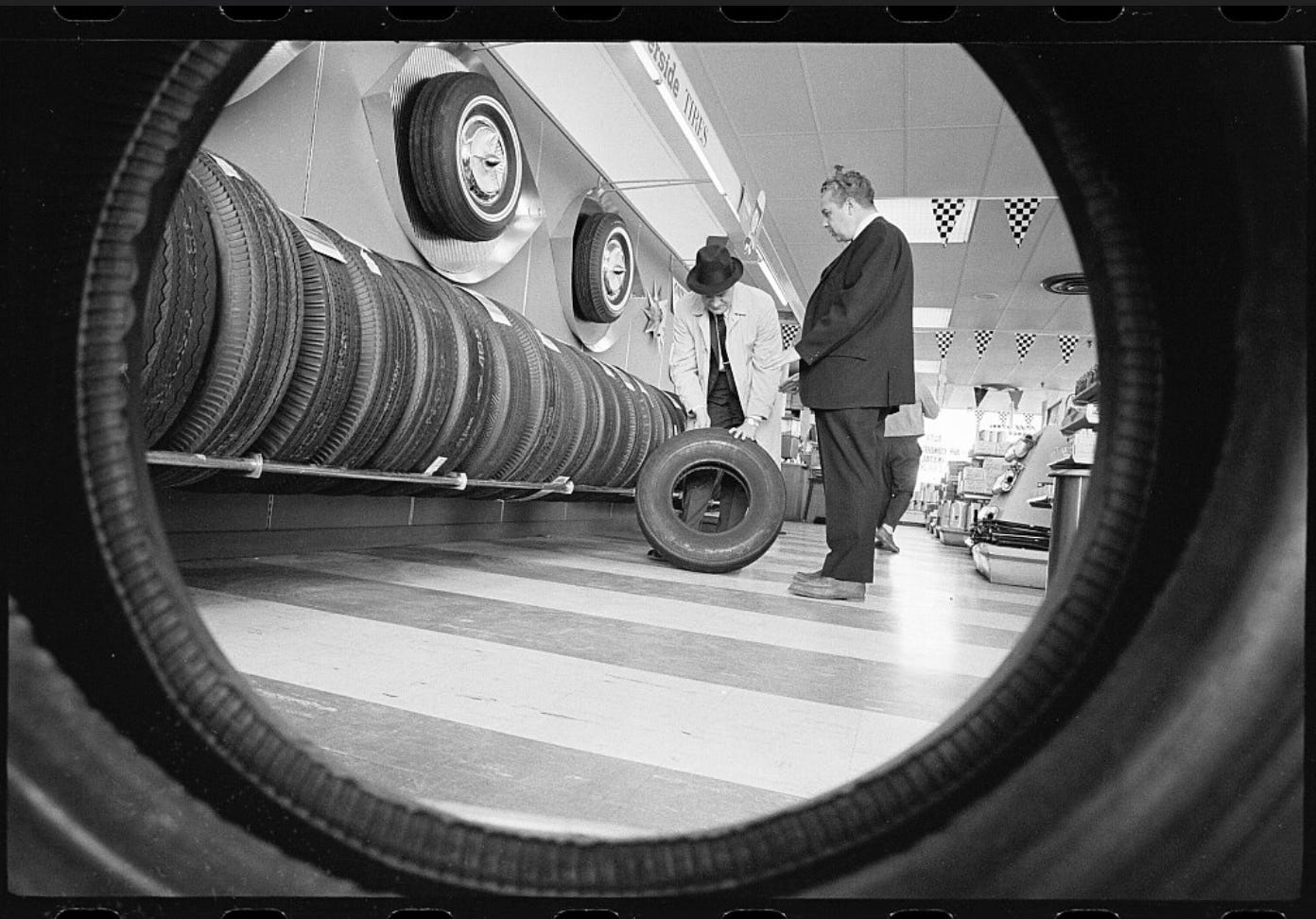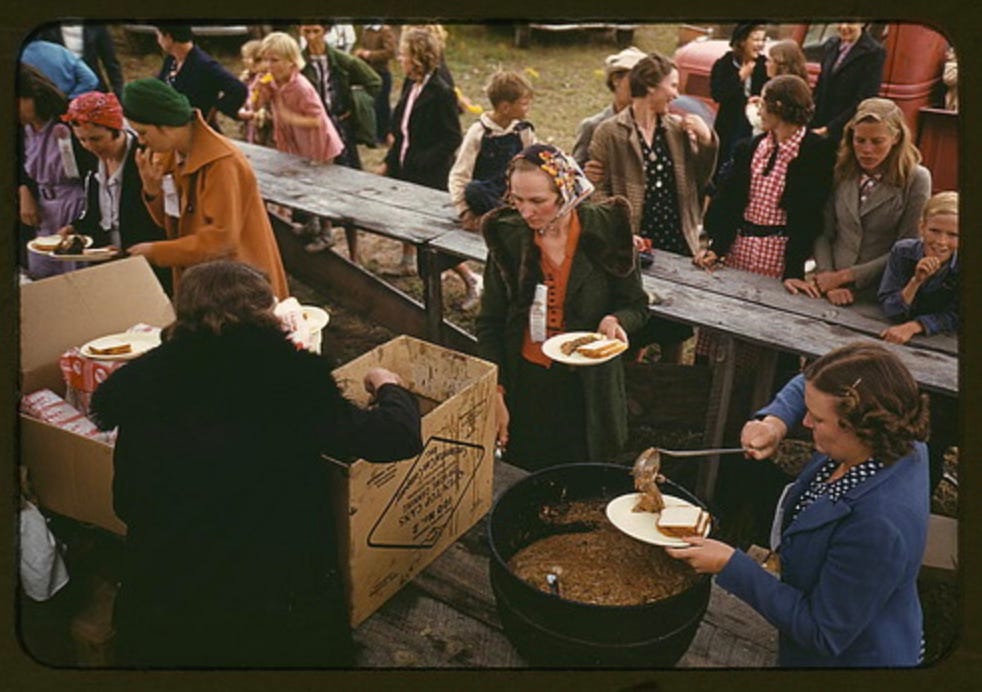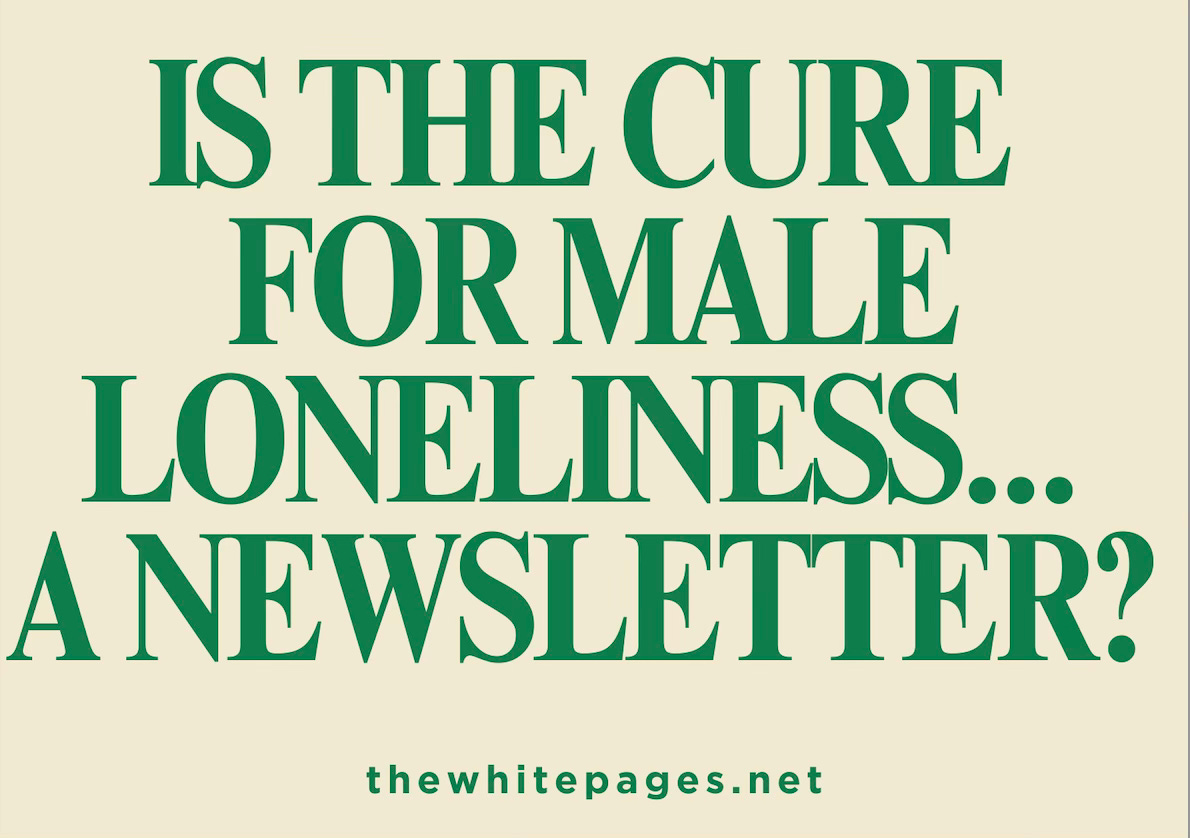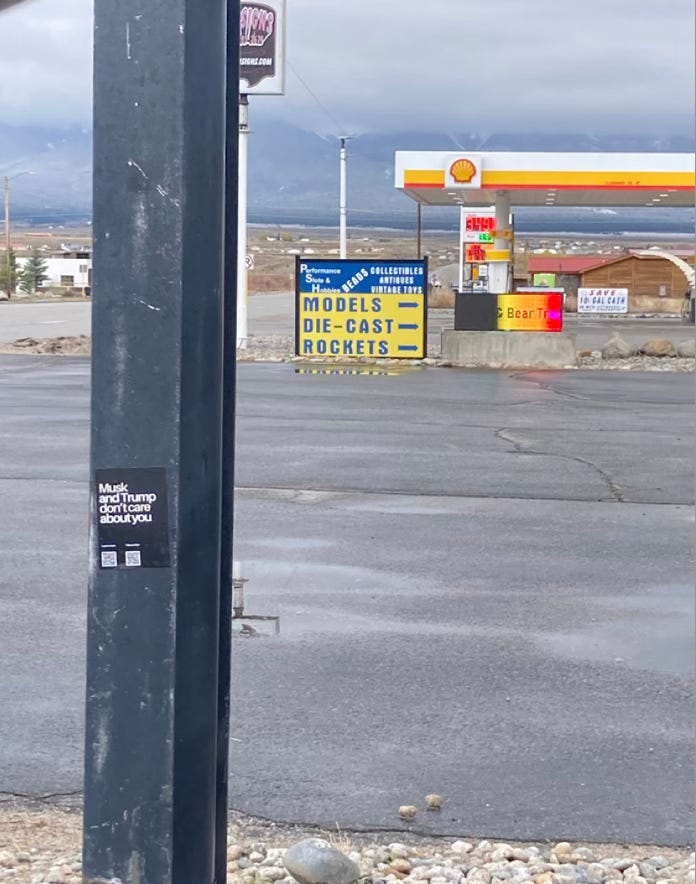You haven't actually failed
You've just been lied to by people who want to sell you something
Let’s be clear. I’m sure that every generation believes that it was the one who was automized and optimized to death. We have been doing a version of this dance for millenia. We had a wheel and then we had a mill and then we had an engine and then we had bombs and air conditioners and before you know it, in the middle of the Arizona desert, we created Phoenix. And listen, I have a great deal of affection for Phoenix, but the shoe fits. The entirety of human history is lousy with dime store Prometheans creating something unnatural and assuring us, a glint in their eyes, that we now can’t live without it.
That’s to say, I can’t prove definitively that my generational experience is at all unique (for the record, I’m a Millennial, increasingly more elder by the week). Of course I’m wont to believe that late capitalism is rotten in a way that’s distinct from early capitalism, but I never put in a shift at a nineteenth century Mancunian foundry. What I can say for certain, though, is that my adult life has been marked by a series of increasingly ludicrous promises– of ease, of escape, of utopias in our pockets. My generation has been told, time and again, not only that a new era of flourishing had arrived but, crucially, that we could participate in it with as little effort as possible. Yes I am talking about the humanity-demeaning, environment-destroying tech promises– every song in recorded history in our ears; food, transportation and shelter at a click in the button; romance (or sex, at least) at the far end of a swipe; a “community” beckoning from behind a walled social media garden. But that’s not the whole story.
I hesitate to lead with the nonstop barrage of Silicon Valley snake oil. It’s 2025, for God’s sake. Do you still need to be told that the tech barons might not have our best interest at heart, that everything they promised would make us more secure and better connected have done the opposite? Of course not, though I wish somebody would tell that to the tech barons. Maybe we just haven’t wordsmithed our plaintive entreaties enough. If only there was an energy intensive technology that promises to do all of our reading and writing and thinking and interacting for us. If only I could type “write a letter to Marc Andreessen telling him to jump in a lake, but persuasively” into a search bar. If only all we needed to do was barely anything at all. Then perhaps we could finally be free.
I wish that the tech hucksters were the only ones whispering promises in my ear. It would be so nice to have a single culprit. But it’s not just that I came of technological age in the iPhone era. It’s that I came of electoral age in the Obama “Hope” era, and of professional age in the social entrepreneurship “one brilliant pitch deck can change the world” era, and of activist age in the era where the bothersome work of union and community organizing was replaced by Instagram influencers shouting “general strike tomorrow!” into the void. We’ve all put in our time at the myth-making factory.
There have already been smart analyses of these lost decades of haughty promises. I’ve loved Rosie Spinks’s and kyla scanlon’s critiques of the false allure of frictionlessness as well as Anne Helen Petersen’s thorough puncturing of the optimization bubble. For months now, I haven’t been able to stop thinking about Elise Granata’s question “how is it possible that a [hip, meticulously branded] swim club 800 miles away manages to be more compelling than a group meeting half a mile from my door? Or a venture-funded peer group appears to have more clout than one that’s existed for 89 years?” Each one of these pieces is a gift– whip-smart, well argued, embarrassingly resonant.
The only thing I’ll add is that when I reflect on a lifetime of promises made (by brands, by bros, by politicians) and eagerly lapped up (by me, and likely by you as well), we weren’t just being sold an absence of friction. We were promised transformation. We were told– implicitly if not explicitly– that the end of history was tantilizingly close at hand. We were assured that whatever future we desired was there for the grasping. What do you want? Inner peace and enlightenment? Cosmopolitan sophistication? A literal revolution? Surely that’s do-able. I mean, they sell weed at boutiques that look like Apple Stores now. Anything is possible.
And yes, like all things, the nature of these promises looked differently across lines of identity. Of course they were always aided and abetted by privilege. But I’m not just talking about “you can have unlimited chauffeur rides if you have enough cash for an Uber” or “you can live forever if you’re a billionaire tech bro who loves blood transfusions and private islands.” I’m talking about our expectations for social movements– that the patriarchy, for instance, could be conquered by girl bosses and Lean-inners, or that white supremacy would come toppling down from a single summer of marches (and therefore that we must have failed if our three months of marching failed to offer complete deliverance from America’s original sin). We have been told over and over again, that the life of our dreams was in fact attainable. Can’t you just reach out and touch it? Why not? What’s wrong with you? We have apps now. Apps! We didn’t used to have them, and now we do.
That’s an ad-man’s pitch by the way. “You should be happy. You should be successful. You should have changed the world. Don’t you feel awful that you haven’t? What if we told you….” Pitches like that have been the diegetic soundtrack of my entire life, and likely yours as well. We haven’t just been told that our lives should be easier, we have been told that we’ve failed for the fact that they aren’t.
Why are we surprised– given that we have been the marks for such an immensely ludicrous con- that it’s been so hard to divorce ourselves from its core logic? Why are we surprised that– on the reactionary right– the most obvious strongman’s siren call (“Trump will fix it”) has been so frustratingly successful? Why are we surprised that we on the left respond to this existential threat by jumping from one shiny object to another (one more “most important election of our life” for the more liberal amongst us; self-righteous but materially hollow social media posturing for those of us further left)? Why are we surprised that there remains a yawning gap between the way so many of us talk about community and the reality of how little we practice it.
We were told that we should have reached the promised land by now. But instead we’re broke and tired and miserable and the most malevolent amongst us are full on Brown Shirts now. How’s that for a rug pull?
I say all this not with a pointed finger, but a sympathetic embrace. You all, I’m overwhelmed by a feeling right now– and though of course I’m livid at the liars who taught us to believe falsehood– it’s not just rage. It’s grace. For myself, for you, for all of us. Of course we haven’t yet built the neighborhoods and towns and cities we deserve. Of course we haven’t turned back the tide of society’s most persistent malevolent forces. Of course we go to one meeting, find that it’s boring or that we don’t immediately connect with the people, and give ourselves permission to skip the next one. We were told that all this would be easy, and it isn’t.
While I write about race and gender and politics and culture, you have likely noticed that I am particularly obsessed with two topics– organizing and community building. I believe, alongside so many others, that we’ll never arrive at a better world without those two vehicles. And the profoundly annoying truth about both practices is that– while they are full of joy and connection and fulfillment (it’s true- knowing your neighbors beats the alternative)– they also require so much. Patience and generosity for the ways that other people are annoying. An immense tolerance for heartbreak. A willingness to engage in repair and accountability when we are not merely irritating to one another but fully harmful. Whatever unhealthy amount of caffeine allows us to respond to PTA to-dos late at night after working both a paid job and a care job.
None of it’s easy, and much of it is low level bothersome. I have never joined a community (even ones I’ve loved and that embrace me) whose meetings I haven’t had to consistently debrief with my wife. I’ve never been a part of a political effort that hasn’t caused me to yell “what the hell are we doing?” at least once a week. I have never had a friendship that I haven’t second guessed. And yes, many cultures are less individualistic than White America, and yes there are structural forces making this difficult here but even if that were not the true, the fact remains. Human beings have never not been prickly and patience-testing and imperfect to one another.
But when we stick with it, we know what happens. The prickly, patience-testing people show us why we love them. And they see why we’re worth loving, even if we’re pretty annoying too. We do find community in the end, and we’re better for it.
There’s both bad and good news in all this, though neither should come as a surprise. We already know that the world we were promised– where a city is meaningfully stitched together by underpaid drivers summoned by smartphones, where spiritual and physical connection can be reduced to an algorithmic “match,” where activism is a failure if the world does not rearrange itself based on a viral post– is a lie. We also know, implicitly if not explicitly, that the kind of work we must do together demands far more time and energy than we have in reserve most days. We know that, given all this, our first efforts will be too hesitant and too small. We know that will sit in too-empty rooms and too-silent webinars and wonder, quite often in fact, “am I doing this wrong?”
I hope you also know the answer. Of course you aren’t doing it wrong. You’re just doing it haltingly. A baby deer isn’t bad at walking; they’re just doing it for the first time. We aren’t good at this yet, but we are trying. And we will keep trying. We will see each other trying. We will notice all the imperfect efforts being made around us. The earth will not shake and the heavens will not open but we will be there, tomorrow and the next day, trying again.
I promise not to lie to you, so I will never tell you that it will be easy. But I will tell you that you can do it. That we can do it. Clumsily and beautifully and together.
End notes:
Yes, I have heard about the cool Quaker protest march. My thoughts on the matter? Hell yeah, Friends.
I’m close to announcing the dates/times for the next Barnraisers Project cohorts! This round will be a bit different— less a class than a smaller multi-week accountability/support/work group for people trying to sustain community spaces. As always, they’re free, virtual and fun. Sign up for the interest list and you’ll get the announcement email (maybe next week? Let’s see!).
For a couple weeks now, I’ve been teasing a merchandise giveaway for paid subscribers. Well, here’s how it’s gonna go down: I’ve got t-shirts and totes (both with the “love harder than the fascists can hate” design) as well as White Pages stickers emblazoned with an absolutely nonsense slogan (“Is the cure for male loneliness… a newsletter?”). I’m not selling them, I’m sharing them. More details coming on Friday (in an email to paid subscribers). I probably won’t have enough for every paid subscriber who wants one, but we’re gonna have a raffle and then see where things stand (and what more I can do for the non-winners). This is my way of thanking the folks who keep this operation running. Which means, yes, if you want in on the fun, now would be the time to upgrade your subscription.


While we’re on the subject of paid subscribers, two other notes there:
The other day I shared a lengthy note about how I feel about this moment (re: paying for media/supporting writers financially). I realized it was the first time I articulated it all in one place, and you know what? I stand by it!
I need to give a special thanks to the crew of subscribers over at The Flyover Politics Discord (one of a few different discussion spaces I convene— this one is shared between paid subscribers of this newsletter and lyz ‘s Men Yell at Me). They helped remind me of some of the great pieces I cited here, and just generally had a super smart discussion that informed this piece in innumerable ways. If you’re one of the folks who contributed to this space, thank you.
I received a number of notable “Trump and Musk don’t care about you” stickers in the wild this week (including a lovely picture of two college friends in Richmond, Virginia) but I’d like to highlight one I received a bit ago. This is from Buena Vista, Colorado, but if you’ve ever lived anywhere in the rural West, this tableau will be instantly familiar. Also, since receiving this picture I’ve become obsessed with the business in the background, which appears to be a model car and sign-making store. Their website is an absolute delight (“visit our fun customers’ blog posts,” it beckons). Don’t have to ask me twice.
Song of the week: “Things You Learn The Hard Way” by Emily Scott Robinson (who rules, and who also occasionally shows up around these parts— hi, Emily). “Sometimes the deepest healing/Comes through the darkest night/And you can't believe how often now/Your mother's words were right.”
As always, the full song of the week playlist is on Apple Music and Spotify.
Related (trust me): Here’s a good story about Kurt Vonnegut buying one envelope.






I guess the one benefit of being Gen X is that we pretty much expected things would suck. Or at least that’s how I remember it.
I read your essay and concluded the following:
Rage is easy. Grace takes effort.
So, onward with Grace.